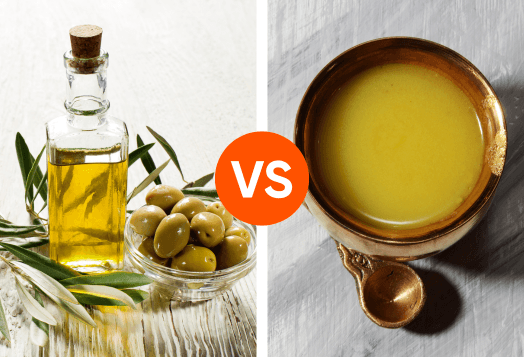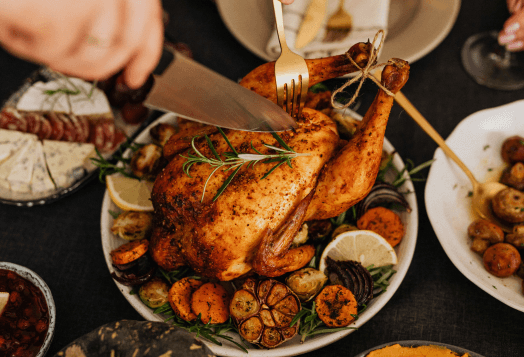When your curious kitty eyes your banana or sneaks a bite off your plate, it can leave you wondering, should they really be eating that?
Understanding what cats can safely eat (and what they shouldn't) is key to keeping them happy and healthy.
Here’s your go-to guide on safe treats, harmful foods, and what baby cats really need.
Feline-Approved Human Foods That Are Safe to Share
Let’s start with the basics: what do cats eat in veg when it comes to sharing human food? Surprisingly, quite a few things, from fruits and veggies to proteins and even a little dairy, similar to safe human foods for dogs. Just remember: moderation is key.
Fruits Cats Can Eat
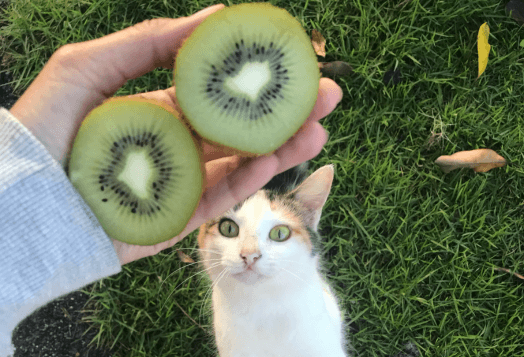
Wondering what human food do cats eat, especially when they eye your fruit bowl? Here are some kitty-safe options you might already have at home.
- Apples: High in vitamins A and C, apples make a crunchy, refreshing snack. Just be sure to remove seeds and core before serving.
- Bananas: Packed with potassium, bananas are safe in small amounts. Too much sugar isn’t great for your feline friend, so offer just a nibble.
- Blueberries: These antioxidant-rich berries support immune health and are safe to feed whole or mashed.
- Strawberries: Full of fibre and vitamin C, strawberries can be served sliced and fresh, but avoid anything syrupy.
- Watermelon: Hydrating and low in calories, watermelon is a summer favourite. Always remove seeds and rind first.
Vegetables Cats Can Eat
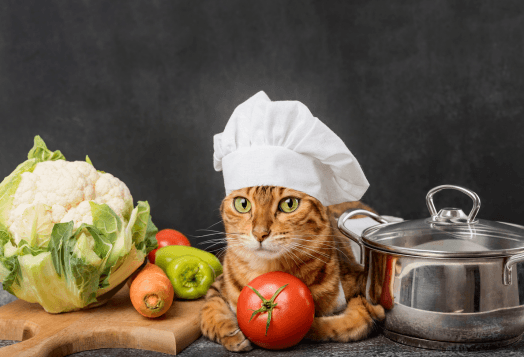
You might be surprised to learn that some vegetables can complement your cat’s carnivorous cravings. So, what do cats eat in vegetables?
- Carrots: Crunchy and good for dental health, carrots can be served raw (grated) or cooked (plain).
- Green Beans: Low in calories and high in fibre, green beans are especially good for cats needing to lose weight.
- Sweet Potatoes: Cooked sweet potatoes support digestion and are rich in fibre and vitamin A. No butter or seasoning, please.
- Pumpkin: One of the best cat-friendly vegetables! It supports gut health and can help with constipation or diarrhoea. Choose plain canned or cooked pumpkin.
- Broccoli: Steamed and chopped broccoli offers vitamin C and antioxidants. Too much can cause gas, so feed sparingly.
Lean Meats for Cats
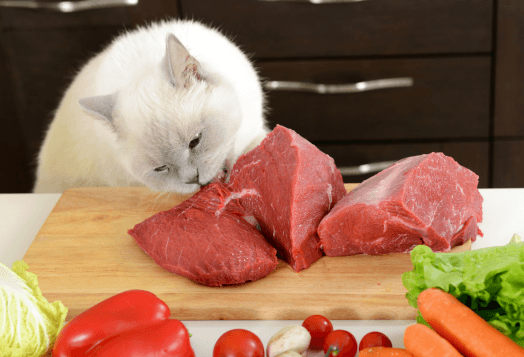
Protein is the cornerstone of any good feline diet. So, what meats are safe and healthy for your cat? Here’s the list:
- Chicken: A lean protein that’s easy to digest. Remove the skin, fat, and bones. Always serve cooked and plain.
- Salmon: Rich in omega-3 fatty acids, salmon boosts your cat’s coat health and brain function. Serve cooked and unseasoned.
- Turkey: Great for cats with sensitive stomachs. Stick to white meat, and avoid processed deli slices.
- Eggs: Cooked eggs are full of protein and amino acids. Scrambled or boiled—just avoid seasoning or raw preparation.
Dairy: Yay or Nay?
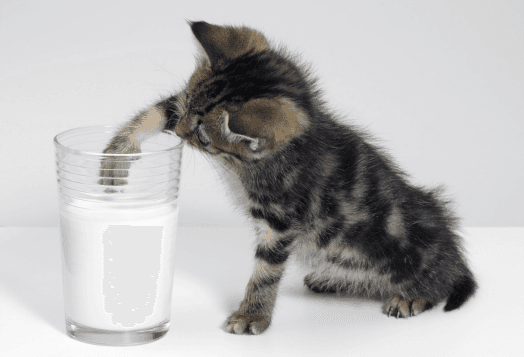
Despite the cliché of cats and milk, many felines are lactose-intolerant. But in small quantities, some dairy can be fine.
- Plain Yoghurt: Loaded with probiotics, plain yoghurt can support digestion. Offer a spoonful occasionally.
- Cheese: High in calcium and protein, hard cheeses like cheddar are safer options. Serve tiny cubes as an occasional treat.
Nuts and Seeds
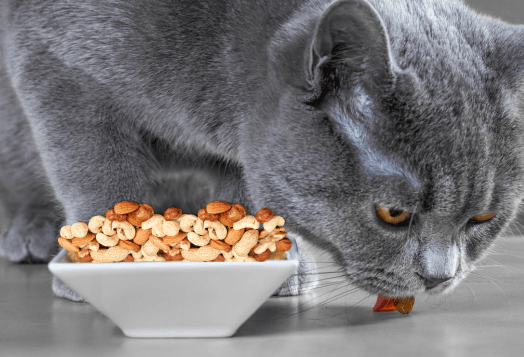
Nuts aren't a natural part of a cat’s diet, but a few options are safe in moderation.
- Peanut Butter: Some cats go crazy for it! Make sure it’s xylitol-free and only serve tiny licks as a treat.
- Pumpkin Seeds: Rich in antioxidants and healthy fats, crushed pumpkin seeds can be sprinkled lightly over food.
What Not to Feed Your Cat
Now that we’ve covered what do cats eat, let’s talk about what they should never eat. These human foods are toxic or dangerous, even in small amounts.
- Chocolate: It contains theobromine, which is toxic to cats. Even a small piece can cause heart issues or seizures.
- Grapes and Raisins: Seem harmless, but can cause acute kidney failure in cats. Keep them far away from your feline friend.
- Onions and Garlic: Raw, cooked, or powdered—they’re all toxic. They can damage red blood cells and lead to anaemia.
- Alcohol: Cats are far more sensitive to alcohol than humans. Even a few licks can cause intoxication or worse.
- Xylitol: Found in sugar-free gum and peanut butter. This sweetener causes insulin spikes and liver failure.
- Caffeine: From tea to chocolate, caffeine overstimulates a cat’s heart and nervous system. Symptoms include tremors and vomiting.
- Raw Meat, Eggs, and Fish: Risk of parasites and salmonella. Always cook protein before feeding.
- Fat Trimmings: Can trigger pancreatitis and digestive upset. Trim the fat, literally.
- Cooked Bones: They splinter easily and can cause choking or internal injuries. Stick to vet-approved chew toys.
What Do Baby Cats Eat?
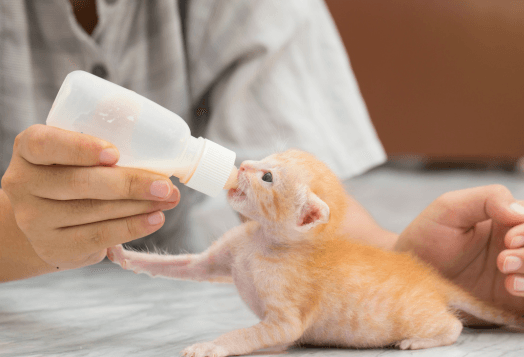
If you’ve just adopted a kitten, you’re likely asking: what do baby cats eat? Their nutritional needs are very different from adults.
- Mother’s Milk: Newborn kittens should nurse exclusively for the first four to five weeks. It’s rich in antibodies and essential nutrients.
- Kitten Formula: If mum isn’t around, use a kitten milk replacer (never cow’s milk). Feed them with a bottle and keep them warm and safe.
- Solid Food Introduction: From 4 weeks onwards, begin introducing soft, wet kitten food. Gradually mix in dry kibble as they grow older.
- Portion Control: Kittens need small, frequent meals, four to five times a day. As they age, the frequency reduces, but the nutrient density should remain high.
Feeding Your Feline Right
We all want to pamper our pets. But when it comes to what food do cats eat, it's important to focus on health and safety over indulgence. Treats are fine occasionally, but your cat’s main diet should always be high-protein, low-carb, and vet-approved.
Incorporating cat-safe fruits, lean meats, or vegetables that cats can eat can boost their nutrition with guidance from pet boarding experts, just be sure you’re doing it right.
Treats with Caution, Meals with Care
Sharing your dinner with your cat might feel like love, but not everything on your plate is safe for them. Knowing what human food cats can eat helps you make better choices for their health and happiness. From a sliver of chicken to a spoonful of pumpkin, every bite should be safe, nutritious, and chosen with care. Cats have delicate digestive systems, and even small amounts of the wrong food can cause harm. The more informed you are with help from pet sitting professionals, the easier it is to treat them right, one tiny snack at a time.


